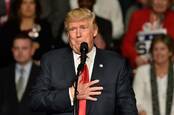This article is more than 1 year old
Trump continues on the warpath: Now US tariffs cover nearly everything arriving from China
Settle in because we are here for the long haul
After a short-lived cease fire, the glorious leader of the United States has announced yet another round of tariffs on Chinese imports, due to be imposed in September.
President Donald Trump said there would be a further 10 per cent levy on another $300bn worth of Chinese imports, in the fourth round of tariff increases by the US since June 2018.
The announcement has already caused a cascade of economic misery: the S&P 500 was down, European and Asian stocks were down, and US Treasury yields were down too, according to the Wall Street Journal.
China is expected to retaliate, kicking the ongoing conflict into overdrive as both sides essentially run out of things to tax.
The trade war started after the US announced a 25 per cent tariff on approximately $50bn of goods from China that "contain industrially significant technologies".
The rationale, according to the White House, was "China's theft of intellectual property and technology and its other unfair trade practices."
"These tariffs are essential to preventing further unfair transfers of American technology and intellectual property to China, which will protect American jobs," the president said in a statement in June 2018 (despite describing the proposed tariffs as "fake news" just days later). "In addition, they will serve as an initial step toward bringing balance to the trade relationship between the United States and China."
That rationale, though, flew out of the window in September 2018, when the White House announced a broad 10 per cent tariff on $200bn worth of Chinese wares – from meat to monopods. Networking equipment, semiconductors and optical fibre equipment were all affected. In May 2019, the tariffs on affected products were increased, as threatened, to 25 per cent.
In June, the situation seemed to be improving. Trump met his Chinese counterpart, Xi Jinping, at the G20 Summit and agreed not to impose further tariffs. It wasn't to last.
On Thursday, Trump took to Twitter (of course) to accuse China of not following through on its promises of buying more agricultural products from the US and stopping the flow of fentanyl, a potent opioid.
"If they don't want to trade with us anymore, that would be fine with me," he later told reporters in a press conference on the White House lawn. "Until such time as there is a deal, we'll be taxing them."
Trump's trade war has already messed with global supply chains, and will undoubtedly do more damage in the months to come.
"In addition to the actual cost of tariffs, we know some of the mitigation efforts by moving manufacturing from location to different locations has resulted in overall slight uptick in our cost of goods sold, really as part of the mitigation. So there is some costs associated with that as well," Rami Rahim, CEO of American networking equipment vendor Juniper Networks, said in an earnings call last week.
In its fresh-off-the-press analysis, the US intelligence corporation Stratfor warned: "Even a 10 per cent tariff, instead of the earlier threatened 25 per cent, will come back to bite American consumers and affect US companies such as Apple.
"Equity markets are predictably diving upon news of the additional tariffs. A prolonged trade war with China will further sour the investment climate, and Trump's trade wars are already sapping global economic growth."
Stratfor noted that one of the options open to the Chinese is a restriction on exports of rare earth materials that are critical to the US tech and defence industries. China is also working on its own "Entity List" – a blacklist where it wants to place companies it considers a threat to its interests.
Meanwhile, in typical "hold my beer" fashion, Japan has just announced its own trade sanctions against South Korea, removing the country from its list of trusted export destinations – which could cause delays for shipments of essential chip components. South Korean President Moon Jae-in promised to retaliate, saying: "We can beat Japan." ®

